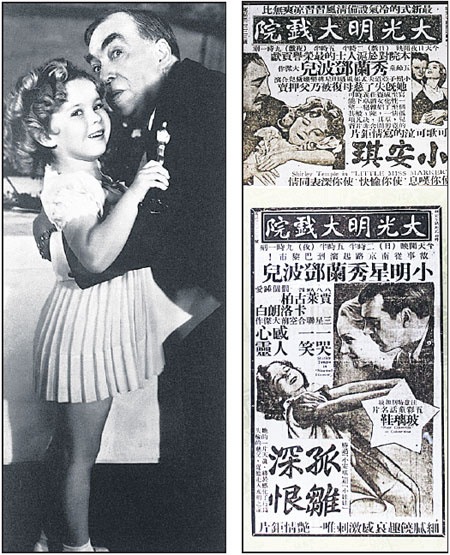Shirley Temple brought out the kid in all of us
By Raymong Zhou ( China Daily ) Updated: 2014-02-14 07:20:35
|
Shirley Temple won the Academy Award in 1935. These 1934 ads for her movies in Shanghai newspapers were collected by the Shanghai Film Museum. Photos Provided to China Daily |
When Shirley Temple visited China in April 1977, it did not cause a sensation. As a matter of fact, it went totally unheeded, with no media coverage or any personal account from the Chinese host.
Like many Hollywood celebrities who descended on the Middle Kingdom shortly after it opened up again to the world, she was a virtual unknown to much of its population. For almost three decades, the Chinese mainland had not screened any Hollywood pictures in public.
Eight years later, Temple, who died this week at the age of 85, became the talk of the nation as many of her major films from the 1930s were broadcast on China Central Television. This came at a time when television sets were available mostly to urban households and viewing options were limited. But still, the size of the audience was enormous in absolute number.
Her films were part of a 20th Century Fox package licensed to CCTV as Rupert Murdoch, the new owner of the Hollywood studio, used the broadcasting rights to these vintage films as a plum to knock on the door to the vast Chinese market. They were aired each Sunday and garnered a loyal following who got their first exposure to entertainment products not stamped with ideology. Movies like The Sound of Music and those starring Shirley Temple were audience favorites.
I first heard her name, in Chinese, in 1983 when my professor of American literature was explaining an allusion in a text. Xiulan Dengboer had a catchy ring to it, unlike most transliterated foreign names of today. Even though I had not seen a photo of her, let alone one of her movies, I instantly remembered it. Many Hollywood stars of the golden era had such fortune, as the translation style of 1930s Shanghai was more elegant and even poetic.

|
|
|
|
|
|
|
|






















 Raymond Zhou:
Raymond Zhou: Pauline D Loh:
Pauline D Loh: Hot Pot
Hot Pot Eco China
Eco China China Dream
China Dream China Face
China Face





